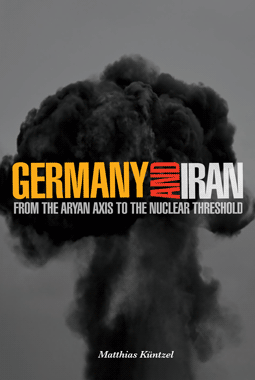“Matthias Küntzel makes it clear that the Islamic Republic of Iran’s policy toward Israel is rooted in deep, historical antisemitism that makes it nothing less than an existential threat to the Jewish people.”
—Ambassador Dore Gold, President, Jerusalem Center for Public Affairs, and Former Representative of Israel to the United Nations
 It’s a “special relationship.” But unlike the one embraced and enjoyed by the US and the UK, the nature of the relationship between Germany and Iran seems clandestine and sinister, and evokes strong feelings of suspicion and fear. In the new book, Germany and Iran: From the Aryan Axis to the Nuclear Threshold, respected political scientist and historian Matthias Küntzel examines the special connection between the “problem” countries of the past and present, and confronts the key issue of Iran’s achieving nuclear weapons capability and the real threat of danger that reality poses for Israel and the United States.
It’s a “special relationship.” But unlike the one embraced and enjoyed by the US and the UK, the nature of the relationship between Germany and Iran seems clandestine and sinister, and evokes strong feelings of suspicion and fear. In the new book, Germany and Iran: From the Aryan Axis to the Nuclear Threshold, respected political scientist and historian Matthias Küntzel examines the special connection between the “problem” countries of the past and present, and confronts the key issue of Iran’s achieving nuclear weapons capability and the real threat of danger that reality poses for Israel and the United States.
Germany and Iran addresses numerous points including:
• Why, despite sanctions, Germany remains Iran’s chief advocate and leading trading partner
• Radical Islam’s role in the resurgence of antisemitism
• The impact of Germany and Iran’s relationship on United States foreign policy and diplomacy
In his previous book, Jihad and Jew-Hatred: Islamism, Nazism and the Roots of 9/11, Matthias Küntzel made a major contribution to our understanding of radical Islamism by tracing the impact of European fascism on the Arab and Islamic world. Called “bracing” and “bold and consequential” by the New York Times Book Review, the book proved Küntzel to be one of today’s most astute interpreters of the Middle East and its relationship with the West.
One of the most pressing challenges of the present day is how the West is going to deal with the Islamist global offensive. Germany and Iran uncovers the disunity of the West in dealing with Iran, and utilizes Germany and Iran’s relationship as a case study to analyze the potential risks and repercussions of combating radical Islam worldwide.
“Matthias Küntzel is one German intellectual who unflinchingly looks into the heart of darkness that is Khomeini’s legacy and hears echoes of the murderous Jew-hatred and fanaticism of Germany’s past. This fine book should be widely read by government officials, political leaders, journalists, think tank analysts, scholars, and citizens who want a better understanding of the Germany’s considerable impact on the Iranian issue.”
—Jeffrey Herf, Distinguished University Professor, Department of History, University of Maryland
About the Author
 Matthias Küntzel is a political scientist and historian in Hamburg, Germany. He has served as senior advisor for the German Green Party caucus in the Bundesag and is currently a Research Associate at the Vidal Sassoon International Center for the Study of Antisemitism at Hebrew University in Jerusalem as well as a member of the German Council on Foreign Relations. Since 2001, his research and writing have focused on antisemitism, Islamism, National Socialism, Iran, and German and Western policies toward the Middle East and Iran. His essays and articles have been translated into twelve languages and published in the Wall Street Journal, the New Republic, the American Foreign Policy Interest, the Israel Journal of Foreign Affairs, Telos, Policy Review, and the Jerusalem Post. His earlier book, Jihad and Jew-Hatred: Islamism, Nazism and the Roots of 9/11, published by Telos Press Publishing in 2007, won a prestigious Gold Award at the 12th Annual Independent Publisher Book Awards.
Matthias Küntzel is a political scientist and historian in Hamburg, Germany. He has served as senior advisor for the German Green Party caucus in the Bundesag and is currently a Research Associate at the Vidal Sassoon International Center for the Study of Antisemitism at Hebrew University in Jerusalem as well as a member of the German Council on Foreign Relations. Since 2001, his research and writing have focused on antisemitism, Islamism, National Socialism, Iran, and German and Western policies toward the Middle East and Iran. His essays and articles have been translated into twelve languages and published in the Wall Street Journal, the New Republic, the American Foreign Policy Interest, the Israel Journal of Foreign Affairs, Telos, Policy Review, and the Jerusalem Post. His earlier book, Jihad and Jew-Hatred: Islamism, Nazism and the Roots of 9/11, published by Telos Press Publishing in 2007, won a prestigious Gold Award at the 12th Annual Independent Publisher Book Awards.



